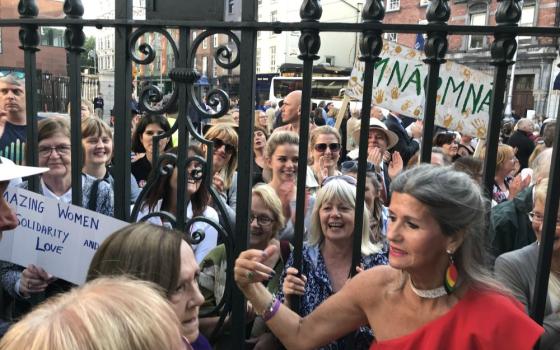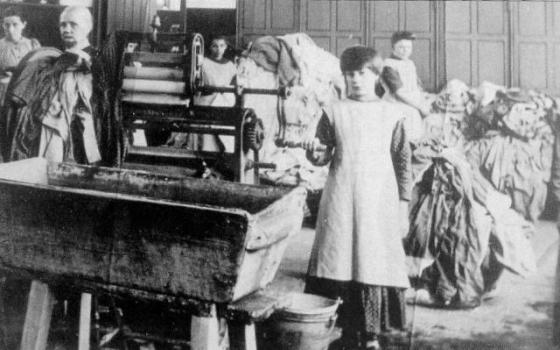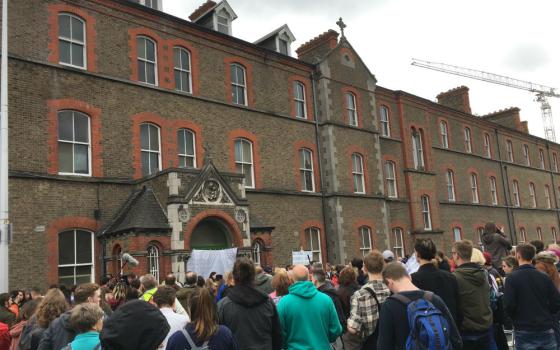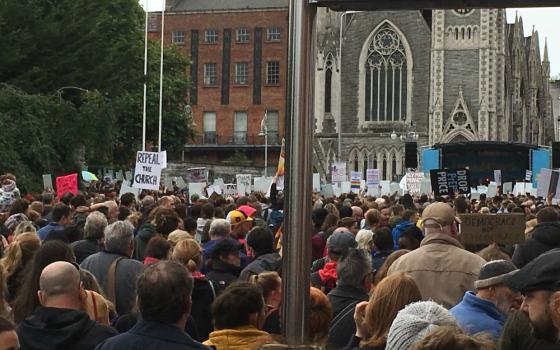Women who worked in Ireland's "Magdalene laundries" but were denied compensation under the state's Magdalene Restorative Justice program have won their long-running battle to have their applications reassessed. New legislation will ensure that payments to the women will be fast-tracked by the Irish state in an effort to make amends for the delay they have endured over their disputed compensation for their time working in the laundries. With many of the women now over 70 years of age, time is not on their side.
In 2018, the spotlight fell on the Magdalene laundries on three separate occasions. In June, state and civic society groups brought together 220 former Magdalenes as part of a healing journey required under the Magdalene Restorative Justice program, which included a presidential apology to the women. Then there was the papal apology from Pope Francis in August at the closing Mass of the World Meeting of Families. The year culminated with the government's decision to extend the redress program to those former Magdalenes incorrectly excluded from the original program.
The need to extend the redress program was highlighted in 2017 by the Irish Ombudsman, Peter Tyndall. In his report on the Magdalene Restorative Justice program, Tyndall highlighted that 15 of the complaints under investigation by his office concerned the Department of Justice's rejection of redress applications by women who had worked in one of the 12 institutions listed as Magdalene laundries in the 2013 "McAleese Report" because they had lived not in the laundry itself, but in a training center or industrial school in the same building or located on the same grounds as a Magdalene laundry. Some of the women took High Court actions to try to force the Department of Justice to recognise that they were entitled to be part of the redress program.
Finally, in 2018, the Irish government relented and took the Ombudsman's recommendation and extended its Magdalene Restorative Justice Scheme to include those women who worked in the laundries but resided in one of 14 adjoining institutions. According Ireland's Department of Justice and Equality, so far 79 women have applied, including 52 whose earlier claims had been denied.
The Irish government, the congregations who ran the laundries and the women who worked in them are still reckoning with this painful part of the country's past. Measures include the compensation program, the reconciliation ceremony held in June and plans for a memorial to honor the 10,012 known entries by women and girls to Magdalene laundries from 1922 until the closure of the last laundry in 1996.
Women were sent to these laundries by the state or by their families usually for the "crime" of being pregnant outside marriage, but not always. Some were confined because they were unruly, orphaned or didn't fit in. The laundries were part of Ireland's architecture of moral constraint, along with mother and baby homes, industrial schools and psychiatric hospitals.
The Magdalene redress program was originally established following the publication in February 2013 of the "Report of the Inter-Developmental Committee to establish the facts of State involvement with the Magdalen Laundries" (popularly known as the McAleese Report, as the committee was chaired by Senator Martin McAleese.)
To date, the Magdalene Restorative Justice Scheme has made awards totalling 26 million euros (about U.S. $33 million) to almost 700 women who worked and resided in 12 listed Magdalene Institutions, which included St. Mary's Training Centre Stanhope Street and the House of Mercy Domestic Training School Summerhill, Wexford run by four Catholic religious orders.
Compensatory payments averaged roughly 36,858 euros (about $47,000) to each woman. The laundries were run by the Mercy Sisters, the Congregation of Our Lady of Charity of the Good Shepherd, the Sisters of Our Lady of Charity of the Refuge, and the Religious Sisters of Charity.
The visit of Pope Francis to Ireland at the end of August placed the spotlight on Magdalene laundries once again following the pontiff's meeting with representatives of clerical and institutional abuse. At the meeting on Aug. 25 at the Apostolic Nunciature in Dublin, the chairman of the Coalition of Mother and Baby Home Survivors, Paul Redmond, had to give Pope Francis a brief history of the Magdalene laundries because the pontiff knew nothing about them. The pope told survivors that there was no parallel in Argentina for that sort of institution.
Women religious participation
The congregations who ran the laundries have said that they were given charge of the women without any compensation from the state or families. The laundries, in which the sisters also worked, were not profitable but a means of support, they said, which the McAleese report also pointed out.
None of the four congregations contacted for this article provided an interview. In a statement to GSR, the Mercy Sisters said, "We did not seek out women to come to the homes, they came to us, were taken there by families or sent there by the State — all of this is detailed in the McAleese Report." The congregation referred to its statement issued in 2013, in which it said, "We acknowledge fully the limitations of the service we provided for these women when compared with today's standards and sincerely wish that it could have been different. We trust that the implications of the changed context are understood by the wider society."
The Sisters of Our Lady of Charity of the Good Shepherd (which is a combined entity of the two congregations) referred to a 2013 statement that noted "this was a societal issue not just a matter for religious, who were involved solely in providing the services. … It is perhaps forgotten that our Sisters also worked in the laundries. We received no state funding to support these women who either came to or were sent to us by various sections of the state, until the final years. We did not seek out the women, we provided a shelter when either requested or directed. The laundries were the only means of support for decades — and as the McAleese Report established, we did not make money from the laundries."
The Religious Sisters of Charity did not respond to a written request for comment. None of the congregations have contributed to the restitution fund.
The Irish government's decision to overturn its exclusion of some women from the compensation program may ease some of the anger of the former Magdalene residents, said Katherine O'Donnell, spokesperson for the Justice for Magdalenes Research group. But the delay in compensating them left some wondering if the state was really serious about righting the wrongs of the past, she said, even as events such as June's "Dublin Honors Magdalenes" took place.
There is concern among former Magdalenes and their support groups over the decision by the Department of Justice's Restorative Justice Implementation Unit to require those women applying now to the compensation program to provide records showing how long they worked in a laundry as a condition of any redress payment.
Officials have indicated that they will seek records from the religious congregations who ran the laundries to cross reference with payment claims. However, the November 2017 report by Tyndall on the Magdalene compensation program, said "there was an over reliance on the records of the congregations and it is not apparent what weight, if any, was afforded to the testimony of the women and/or their relatives."
In her interview with GSR, O'Donnell outlined a number of concerns with Department of Justice officials' administration of the program. Women who formerly worked in the laundries, she explained, were not "given the full time allotted to them to recount their testimonies, and the word of a nun seemed to count for more," she said.
O'Donnell stressed that much more is needed to be done in order to bring closure to this painful part of the women's past. "The Department of Justice was supposed to have a dedicated unit to help these women access all the kinds of services such as housing, healthcare, counselling — and they haven't done that. There is a myriad of ways in which they are reneging on the redress scheme," O'Donnell said.
A plan by a Japanese company to develop the last remaining closed Magdalene laundry in state ownership into a hotel, which would have included a memorial to the women, was rejected in September by Dublin city councillors. Women who had once been detained in Magdalene laundries applauded from the public gallery of City Hall when the decision was announced.
"I think most people felt that it would have been inappropriate to have the promised memorial to Magdalene survivors placed within the confines of a hotel … outsourcing such an important memorial at a time when we are still coming to terms with the truth and the reckoning of those particular buildings," said Councillor Gary Gannon, a Social Democrat, in an interview after the vote with Irish national radio (RTE's Morning Ireland program).
The McAleese report was critical of the religious orders but also found evidence of substantial state involvement in the Magdalene system. This finding led the then prime minister, Enda Kenny, to apologize unreservedly in 2013 in the Irish Parliament on behalf of the state to the Magdalene survivors.
Documentation spotty
The McAleese Report showed that there were 14,607 admissions to the laundries between 1922 and 1996. This figure included repeat admissions among the 10,012 known women and girls admitted. The youngest known entrant was just 9 years old while the oldest was 89. The average age of the women at the time of entry was 23.8. The report also showed that 13.5 percent of entrants had no living parents and 879 known deaths occurred in the laundries between 1922 and 1996. This figure excludes two Magdalene laundries operated by the Sisters of Mercy.
It documented involuntary detention at the laundries and a failure to inform the women and girls why they were being detained or when they might be released. The median duration of stay according to the report was about seven months, but in many cases it was much longer. It noted that the women were stripped of their identities, unpaid and forced to work constantly. They were denied education and contact with the outside world, and some were subjected to humiliating and degrading punishments.
Yet the report also noted that "a large majority of the women who shared their stories with the Committee said that they had neither experienced nor seen other girls or women suffer physical abuse in the Magdalen Laundries."
A number of those who died while shut up in the laundries were buried in unmarked graves, and in some cases their deaths weren't officially registered, according to the McAleese Report. The issue of the non-registration of Magdalene deaths first came to light in 1993, when the remains of 155 former Magdalenes were exhumed from a mass burial plot on land owned by the Sisters of Our Lady of Charity who ran the High Park laundry in Dublin. The congregation was preparing to sell 12 acres of land, which encompassed the burial plot, for housing.
A public furor followed the revelation that there were no death certificates for many of the women whose remains were exhumed. Documentation was either missing or inadequate to allow the remains be properly identified.
Campaigning by Justice for the Magdalenes on behalf of the women who had once been detained in the laundries was pivotal in bringing the issue to the attention of the U.N. Committee Against Torture (UNCAT) in 2011. When the Irish State was heavily criticized by UNCAT over the laundries, the government set up the McAleese inquiry in 2011 to determine if there was any state involvement in the laundries.
The state had argued in its submission to UNCAT that the majority of the women had been admitted voluntarily to the laundries and, in the case of minors, had been put there with the consent of their families. But when the McAleese Report was published two years later in 2013, its findings showed this was not the case. According to the report, at least 26.5 percent of admissions to the Magdalene laundries involved state entities such as the Irish police, while other state bodies such as hospitals had contracts with laundries. State involvement was undeniable.
Congregations respond
Following the publication of the McAleese report, the four religious congregations who ran the laundries released statements. The Sisters of Mercy, who had laundries in Galway (closed in 1984) and Dun Laoghaire (closed in 1963), said they had "at the request of others, established a home for women. In order to fund that service, we ran a laundry — the only funding available for the greater part of the history of the homes. These laundries, as the report shows, were not profit making as has been suggested, and we in fact supported the upkeep of the women from other sources, as best we could." Records from the Galway laundry, they said, showed this.
None of the four congregations contributed any money to the redress fund for the former Magdalenes despite a request from the Irish government in February 2013 and January 2014 that they do so. Documents released under the Freedom of Information Act and reported in the Irish Examiner newspaper show that Sr. Bernadette McNally, provincial leader of the Good Shepherd Sisters, told the government that her order's finances meant it could not afford to contribute.
The then-leader of the Sisters of Our Lady of Charity Sr. Sheila Murphy wrote in June 2013 to then-Minister for Justice Alan Shatter and said her congregation had decided not to contribute any money after examining the findings of the McAleese Report. That same month, Sr. Mary Christian, the congregational leader of the Sisters of Charity, also wrote to Shatter and said: "Having considered the [McAleese] report, I wish to confirm that the Sisters of Charity will co-operate with the release of relevant information to any woman who requests same, we are prepared to meet with any past resident of our Magdalene homes who so wishes and will continue to provide services to residents in our care. Unfortunately, we are not in a position to make a monetary contribution to the fund."
The Congregational Leader of the Sisters of Mercy told the government in August 2013 that its decision not to contribute was "carefully considered"and had been flagged in advance of the announcement of the redress scheme.
On the final day of Pope Francis' visit to Ireland in August, and despite the inclement weather, more than 1,000 people attended the "Stand4Truth" demonstration in Dublin city center as a gesture of solidarity with the victims of clerical and Catholic institutional abuse, including Magdalenes. The gathering was timed to coincide with the papal Mass in the Phoenix Park on Aug 26. Afterwards, participants marched in silence to the abandoned laundry on Sean McDermott Street.
One of those who attended the rally was Gabrielle O'Gorman, who spent six weeks at the Sean McDermott Street laundry before she was sent to the laundry run by the Good Shepherd Sisters in Limerick for two and a half years. The 73-year-old flew in from Britain specifically to attend the gathering. She told GSR she was happy with the turnout. "I think the biggest thing for all of the ladies is that people believe us now. They didn't in the past; they said the nuns wouldn't do that or you must have deserved it. But it is so different now from when I left 50 years ago, and I am really glad of that."
Life in the laundry
O'Gorman was born in a mother and baby home in August 1945. When she was four, her mother left her at the home, run by nuns, to go in search of work in Britain. She was sent to the Magdalene laundry when she was 17 after she broke a 10 p.m. curfew. She told GSR that she felt the nuns were "just being spiteful. If you were a little free-spirited like I was — and some of the other girls were, too — they would clip your wings."
Life in the laundry consisted of work, singing hymns and praying, O'Gorman said.
"They would start work at 8 a.m. in the morning and work until about 6 p.m.. Then they were given their food and it would be off to bed at 9 p.m. Masses and prayers were thrown in, especially on Sundays, and there was no talking allowed in the laundry; we were only allowed to sing hymns. All I remember of the first day in the laundry is this big room with all these rollers where they put the sheets in one side and they came out the other side, where two women were folding them. It was full of steam and a nun was walking around. The women weren't allowed to talk."
O'Donnell is part of the Justice for the Magdalenes Research Group and an associate professor at University College Dublin's School of Philosophy. She has worked with some of the women who were detained in the laundries. She advocates restorative justice and transitional justice as a way for Irish society to deal with the legacy of its past. Transitional justice, she explains, has been used in other regions that have attempted to deal with gross and systemic human rights abuse such as the treatment of indigenous people in Australia and Canada.
Speaking to GSR, O'Donnell was critical of the religious orders who ran the laundries for "blocking" efforts to obtain documentation and giving access to their archives, which she said would deepen Irish society's understanding of the history and context of the operation of the laundries. "Justice for the Magdalenes campaign wrote to them numerous times. I personally met with many members of the four orders, and they were unpersuaded by me that there was an opportunity for apology, reconciliation or even reflection for themselves. My impression is that they feel injured and that they consider that silence is serving them extremely well."
However, the Sisters of Mercy told GSR, "After the laundries closed there was ongoing contact between some of the women and the Sisters. Some women stayed on with us and asked to be buried in our cemeteries. We have a long-standing policy of meeting all those from past services who wish to meet, and we provide them with information from our archives if so requested."
The Mercy Sisters also reiterated their statement issued in 2013 in which they said, "We provided a home and a shelter, which by today's standards was inadequate in terms of meeting the many complex needs of these women. We are saddened that Irish society could not have found a more caring and comprehensive response to women who were in many cases destitute, alone, cut off from their families and communities and often dealing with very serious personal issues. We are saddened that we could not have done more for these women, who deserved better, not just from us but also from the various strands of society, which were part of, and aware of the challenges these women faced."
But for O'Donnell, the silence of most of the religious orders is frustrating and disappointing as she would like to see the religious orders become part of a process of transitional justice in Ireland. "The ball is totally in their court. There are all kinds of ways in which they could begin to do this, but they seem to think that silence — and I would suggest a rather haughty silence and a silence that seems to be piqued and injured — that this is the way to go. That silence speaks volumes."
The reluctance of the four congregations to engage with the media, campaigning groups and historians was discussed by University College Dublin Professor Diarmaid Ferriter in a recent article in the Irish Times. Referring to the latest edition of the Jesuit quarterly Studies, which is themed "The Nuns' Story," Ferriter noted that the silence of religious congregations and "selective imparting" of their history does no favors but rather contributes to the caricature of "bad nuns" that has developed in recent decades. "We certainly need more balance and the avoidance of cartoon depictions of any congregation," Ferriter stressed, "but religious congregations need to play their part."
[Sarah Mac Donald is a freelance journalist based in Dublin.]










